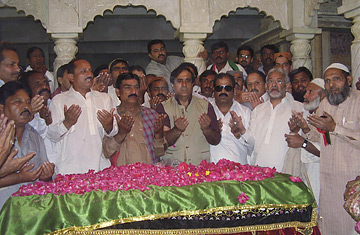
Supporters of the opposition Pakistan People's Party (PPP) offer prayers at the grave of their party's founding chairman and former Prime Minister Zulfikar Ali Bhutto at Garhi Khuda Bukhsh near Larkana.
The tomb of Zulfikar Ali Bhutto, the populist Pakistani President overthrown in a military coup in 1977 and executed the following year, looms like an hallucinatory apparition over the poverty-stricken salt marshes of central Sindh Province. Meant to evoke the soaring grandeur of Mughal monuments, from a distance the concrete monstrosity rather resembles a Play-Doh model of the Taj Mahal pinched to fit on a foundation substantially trimmed by the high price of land in the family's ancestral seat of Larkana.
Shortly after her return from exile on October 18, Bhutto's daughter and political heir, former Prime Minister Benazir Bhutto, plans to visit the mausoleum she began building as a tribute to her father in 1996, three years before she fled into exile under a cloud of as yet unanswered corruption charges. But while thousands of her supporters have promised to welcome her home, leaders of her Pakistan People's Party concede that the size of the crowds will likely be but a fraction of the millions that turned out to cheer her triumphant return in 1988, to claim her father's mantle and lead the country back to democracy after a decade of military rule.
Bhutto's mausoleum is testimony more to his daughter's ambition than to his own self-image — before he was hanged, he had requested nothing more than a humble marble slab like those on the graves of his ancestors in the family plot. But, conscious of the power of image in Pakistani politics, Benazir opted instead for the 130-foot onion dome. Impressive as its facade may be, however, it conceals a shabby interior of chipped marble floors and peeling concrete pillars. The walls bear spray-painted messages in support of her estranged brother, Murtaza Bhutto, murdered by unknown assailants 11 years ago. Not that she'll see these slogans questioning her credentials to lead Pakistan. Says the tomb's custodian, Muhammad Issa, "We will whitewash the walls before she returns."
It may take more than whitewash, however, to restore Bhutto's image as a tireless campaigner against military rule. Talks of a power-sharing deal with General Pervez Musharraf, who seized power in a coup, have dimmed voter enthusiasm for her party, as have her statements that she would allow U.S. military strikes against terrorists in Pakistan, and would make nuclear proliferator (and national hero) A.Q. Khan available for questioning by the IAEA. Pakistan's parliament votes for a President on October 6, and the increasingly embattled Musharraf desperately needs the support of Bhutto's party. She, in turn, wants the corruption charges — which she dismisses as baseless and politically motivated — dropped before her return. On Tuesday, government officials agreed "in principle" to quash all the cases, although the terms and conditions of such an amnesty are not clear.
"She has disgraced the Bhutto name," says Mumtaz Bhutto, the clan patriarch and her father's uncle. "She had to run away to escape her sins. The country has gone through hell for 10 years, and where was she? The only way she could come back was by a deal. The stigma will stay forever." Still, like many in Sindh, he plans to vote for her party because it represents the region in a national political scene dominated by Punjabi interests.
In exchange for their support, Bhutto's followers in Larkana expect her to deliver jobs and infrastructure and to alleviate poverty. More generally, her voters would expect her to maintain Musharraf's extraordinary success in stewarding the national economy, which has been growing at an annual rate of 7% — and they will want her to deliver on her promise to put an end to terrorism. Her promises, like her political ambitions and her father's tomb, are outsize.
In 1988, Benazir returned home to acclaim as the savior of Pakistani democracy. If that feat is to be repeated, voters would have to be so desperate to end military rule that they would overlook not only any deal she might strike with Musharraf, but also the widespread human rights abuses and epic corruption that prevailed in Pakistan during her last stint in power.
Still, the heartland in Sindh remains a solid base of support. Despite the socialist platform of both Bhutto and her father, both are beneficiaries of an almost feudal system in Sindh, where landlords and tribal leaders dictate how their people vote. In keeping with this tradition, many of these voters don't question Benazir's judgment in cutting deals with Musharraf, or anything else. "If Benazir got a horse, and told people to vote for the horse," says 27-year-old Larkana shopkeeper Muhammad Ali Sheikh, "we would line up to vote for the horse."
